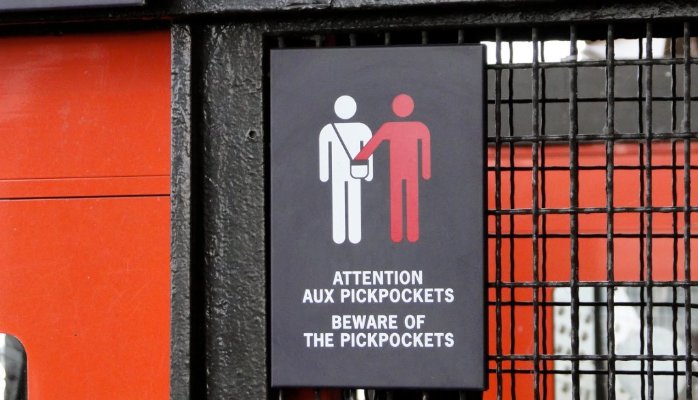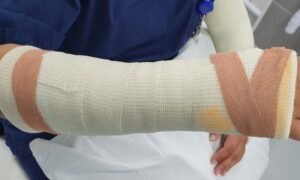It’s spring, and you’re living in Paris. Dreams coming true.
Lights along the Seine. Strolling on Champs-Élysées. The street artists in Montmartre. Un vin rouge on Boulevard Saint-Germaine. The Louvre.
The Paris Police Prefecture, reporting your pockets picked, wallet stolen, bag snatched, car missing, apartment broken into, packages heisted, identity filched. Paris has a reputation for a high rate of street crime, even among all the large cities of Western Europe. That said, the worst city for pickpockets is Barcelona, and Oslo – believe it or not – isn’t far behind, according to Western Union. For the record, you’re most likely to get mugged in Rome. The great part of being an expat is, you see so much more of Europe. The down side of being an expat is, you’re more likely to find yourself in the same touch-and-go situations as the locals because you are a local.
 If you track European media reports, you’ll know that pickpockets working the area around the Eiffel Tower got so bad last summer that French employees at the landmark tourist attraction went on strike!
If you track European media reports, you’ll know that pickpockets working the area around the Eiffel Tower got so bad last summer that French employees at the landmark tourist attraction went on strike!
The thieves “form a gang of four to five people,” and sometimes there can be about 30 of them surrounding the tower, one of the striking workers told the AFP news agency. Occasionally they even “fight among themselves.” Another striker said that he had been threatened while chasing away a pickpocket: “He said to me, ‘why don’t you let us work… if this continues you will have problems’.”
The French are eager to point out that most Parisian street crimes are non-violent, as if that’s some comfort. But the density of crowds makes invasive theft – like picking pockets and snatching purses – especially prevalent.
Foreigners, whether tourists or expats, are particularly vulnerable because they stand out, asking for directions, trying to hold conversations in halting French, looking at their maps and guidebooks. Americans are seen as especially ripe picking because they probably have a lot of money, too much trust and too little street savvy.
It’s amazing how crime advisories for Paris sound pretty much like advisories for any other city, from San Francisco and New York to London and Oslo:
Be particularly attentive in congested areas – museums, monuments, train
stations, airports, the Metro.
 The French police say thieves favor congested areas at popular tourist sites, like the crowded elevators at the Eiffel Tower, escalators at museums such as the Louvre, and the area surrounding Sacré Coeur Basilica in Montmartre.
The French police say thieves favor congested areas at popular tourist sites, like the crowded elevators at the Eiffel Tower, escalators at museums such as the Louvre, and the area surrounding Sacré Coeur Basilica in Montmartre.
Here are some practical tips for expats to avoid the anxiety of losing your cash, or even your passport.
• Avoid economically depressed neighborhoods, even when driving. Keep doors locked and windows rolled up, and valuables out of sight. Exercise extra caution when out alone, especially at night, especially if you’re a woman.
• Be especially aware of children in crowds. They’re commonly used for street theft because they’re difficult to prosecute under the age of 16.
• Take extra security precautions in August, when Parisians go on vacation and thieves know many homes and apartments are vacant.
• Be vigilant on Metro Line 1, which traverses the city center from east to west. Its stops include many major tourist sites.
• Be suspicious if you’re suddenly engaged in conversation by a stranger, or if a disturbance erupts nearby – it might be intended to distract you.
• Another common area of criminal activity is on the rail link, RER B, from Charles de Gaulle Airport to the city center. Travelers might want to consider using a shuttle service, or one of the express buses to central Paris, rather than the RER.
• Be careful with putting down your credit cards, wallet, passport, etc., while making purchases at the major Parisian department stores (e.g., Galeries Lafayette, Printemps, Le Bon Marché) – you know, like you would at Macy’s or Kohl’s in the U.S.
• Paris is a 24-hour city, but that doesn’t make it Disney World. After dark, less-utilized metro stations and adult-activity centers like Pigalle and Les Halles can be particularly threatening for unsuspecting expats.
 • Don’t just get into any car offering transportation from the airport, especially after midnight when many arriving international flights make the airport crammed with multi-lingual activity. (Personal experience: It can be costly and might well be dangerous. That’s true, by the way, of major airports throughout Europe and around the world.)
• Don’t just get into any car offering transportation from the airport, especially after midnight when many arriving international flights make the airport crammed with multi-lingual activity. (Personal experience: It can be costly and might well be dangerous. That’s true, by the way, of major airports throughout Europe and around the world.)
Use only authorized taxis, identifiable by: an illuminated “Taxi Parisien” sign on the roof; a display meter showing the cost of the trip; a display at the rear of the vehicle and visible from the exterior that enables the monitoring of the daily duration of use of the vehicle; and a plate fixed to the front fender bearing the license number.
If you’re a victim of street crime, the French equivalent to the “911” emergency line in the U.S. is “112.” Non-French speakers may experience a delay while an English-speaking operator is located.
Alternatively, you can call French emergency numbers specific to the type of incident: 17 (police emergency); 18 (fire department/paramedics); or 15 (medical emergency/paramedic team/ambulance).
 It would be nice if you carried Liam Neeson’s cell phone number, as well, since he has shown in the “Taken” movie series a unique capability for getting the attention of the Parisian constabulary.
It would be nice if you carried Liam Neeson’s cell phone number, as well, since he has shown in the “Taken” movie series a unique capability for getting the attention of the Parisian constabulary.
But it would be more practical to establish your own guidelines for safe conduct in Paris, and save Liam for the kidnapping crimes.














